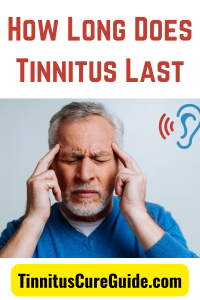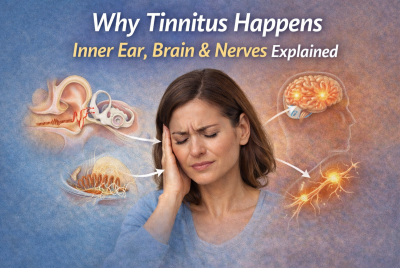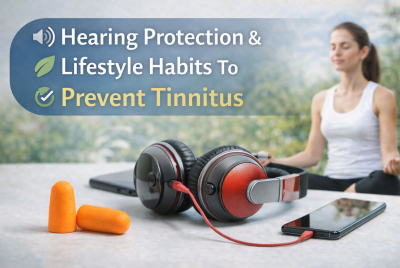How Long Does Tinnitus Last
Curious about tinnitus duration and how long does tinnitus last? Learn its causes and effective management techniques. Tinnitus can be a bothersome condition that affects millions of people worldwide. As someone who is passionate about hearing health and well-being, I understand the concerns and questions that arise when dealing with ear ringing. This article will explore the duration of tinnitus and the factors influencing its duration and provide helpful suggestions to manage this condition.
Introduction
When it comes to ringing in the ears, the duration of the condition can vary from person to person. While some individuals may experience temporary tinnitus that lasts for a short period, others may have chronic tinnitus that persists for a longer time. Understanding the factors that contribute to the duration of ear ringing can help individuals navigate this condition more effectively.
Understanding Tinnitus
Ear ringing is characterized by the perception of sound in the absence of any external noise. It can manifest as ringing, buzzing, hissing, or other sounds that only the person experiencing it can hear. Ringing in the ears can be caused by various factors, including exposure to loud noise, ear infections, age-related hearing loss, and certain medical conditions.
Common Causes Of Tinnitus
To better comprehend ear-ringing duration, it is essential to explore its common causes. Exposure to loud noise, such as attending concerts or working in a noisy environment, can trigger temporary ear ringing that typically lasts for a few days. In these cases, the auditory system needs time to recover from the excessive noise exposure.
Chronic Ear Ringing
On the other hand, chronic tinnitus can be caused by long-term exposure to loud noise, prolonged use of certain medications, underlying medical conditions, or age-related hearing loss. Chronic ear ringing tends to persist for longer durations and may require comprehensive management strategies.
Duration Of Tinnitus
Factors Affecting Tinnitus Duration
Several factors can influence how long ear ringing lasts for an individual. These factors include the underlying cause of ear ringing, the severity of the condition, overall health, and the presence of any comorbidities. Additionally, the individual’s ability to manage stress and their mental well-being can also impact the duration of ear ringing.
Short-Term Tinnitus
Short-term ear ringing is often associated with temporary exposure to loud noise or a recent ear infection. In most cases, short-term ear ringing resolves on its own as the auditory system recovers. However, if the symptoms persist or worsen, seeking medical help is recommended to rule out any underlying issues.
Chronic Tinnitus
Chronic tinnitus is a persistent or long-lasting condition that lasts for more than six months. It can have a significant impact on a person’s quality of life, causing distress, anxiety, and sleep disturbances. Managing chronic ear ringing often requires a multidimensional approach involving medical intervention, lifestyle changes, and coping strategies.
Seeking Medical Help
If you are experiencing ear ringing that persists beyond a few weeks or is accompanied by other concerning symptoms, it is advisable to seek medical help. An ear, nose, and throat (ENT) specialist or an audiologist can evaluate your condition, identify potential underlying causes, and recommend appropriate treatment options.
Home Remedies For Tinnitus
While there is no known cure for tinnitus, several home remedies can help alleviate its symptoms. These remedies include practicing relaxation techniques, such as meditation or deep breathing exercises, avoiding exposure to loud noise, using white noise machines or fans to mask the ear-ringing sounds, and maintaining a healthy lifestyle with regular exercise and a balanced diet.
Lifestyle Changes To Manage Tinnitus
In addition to home remedies, making certain lifestyle changes can positively impact managing ear ringing. These changes include reducing stress levels, avoiding caffeine and alcohol, getting enough sleep, and practicing good hearing hygiene, such as using ear protection in noisy environments. Adopting a holistic approach to managing ear ringing can contribute to better overall well-being.
Coping Strategies For Tinnitus
Living with ear ringing can be challenging, but there are coping strategies that can help individuals navigate this condition. These strategies include educating oneself about tinnitus, joining support groups or seeking counseling, using sound therapy devices or smartphone apps to provide relief, and practicing stress management techniques. Implementing these coping strategies can empower individuals to regain control over their lives despite having ear ringing.
The Importance Of Mental Health
Tinnitus can have a significant impact on an individual’s mental health and emotional well-being. The distress caused by ear ringing can lead to anxiety, depression, and difficulties with concentration and sleep. Seeking support from mental health professionals or joining ear-ringing support groups can be beneficial in managing the emotional aspects of this condition.
Support And Resources For Tinnitus
Fortunately, there are numerous resources available to individuals dealing with ear ringing. Online communities, forums, and support groups provide a platform for sharing experiences, seeking advice, and finding solace in knowing that one is not alone in their journey with ear-ringing. Additionally, professional organizations and healthcare providers offer information, guidance, and access to specialized ear-ringing treatment options.
Tinnitus Recovery Rates

Tinnitus recovery rates vary widely depending on the underlying cause and individual factors. Temporary ear ringing caused by factors like loud noise exposure may recover quickly within a few days or weeks. However, chronic or long-term tinnitus recovery rates are more variable and may not be as predictable. Some individuals experience partial or complete relief over time, while others may find their symptoms persist. Seeking medical evaluation and appropriate management can improve recovery rates and quality of life for those affected by ringing in the ears.
Will Tinnitus Go Away On Its Own
Tinnitus can go away on its own in some cases, especially if it is caused by temporary factors like exposure to loud noise or certain medications. If ringing in the ears is due to an underlying condition, such as ear infections or excessive earwax, it may resolve once the underlying issue is treated. However, ear ringing may become chronic for some individuals and persist over time. Seeking medical evaluation is crucial to identify the cause of ringing in the ears and determine appropriate management. While there is no guaranteed cure, various treatments, and lifestyle adjustments can help manage tinnitus and improve quality of life.
How Long Does Temporary Tinnitus Last
The duration of temporary tinnitus varies depending on its underlying cause. Temporary ear ringing may last from a few minutes to a few days or weeks. In some cases, exposure to loud noises, such as concerts, can cause temporary ear ringing that resolves within 24 hours. Other causes, like ear infections or excessive earwax buildup, may lead to temporary ringing in the ears that persists for a few days to a week. If the temporary ringing in the ears is stress-related, it might improve as stress levels decrease. However, if ear ringing persists beyond a few weeks or if it becomes chronic, it’s essential to seek medical evaluation for proper diagnosis and management.
How Long Does Tinnitus Last After Head Injury
The duration of tinnitus after a head injury varies widely. In some cases, tinnitus may resolve on its own within a few weeks or months after the injury. However, for others, it can become a long-term or chronic condition. The severity of the head injury, the extent of damage to the auditory system, and individual healing rates play crucial roles in determining tinnitus duration. Seeking prompt medical attention after a head injury is essential to assess and manage ringing in the ears appropriately and potentially improve its outcome.
What Causes Permanent Tinnitus?
Various factors can cause permanent tinnitus, the most common being damage to the auditory system. Prolonged exposure to loud noises, such as concerts or heavy machinery, can lead to irreversible inner ear damage and persistent ear ringing. Age-related hearing loss and certain medical conditions affecting the auditory nerves, such as Meniere’s disease or acoustic neuroma, can also cause permanent tinnitus. Head injuries, ear infections, and ototoxic medications may also contribute to lasting tinnitus. Also, if left untreated, chronic conditions like high blood pressure or stress-related ear ringing may become permanent. Preventative measures and timely medical attention are vital to avoid permanent ear ringing.
How Do I Know If My Tinnitus Is Permanent
Determining if tinnitus is permanent requires a thorough evaluation by a healthcare professional. If tinnitus persists for more than six months, it is considered chronic, increasing the likelihood of it being permanent. Other indicators include continuous or worsening symptoms despite various treatments. Additionally, if ear ringing is caused by irreversible factors like severe hearing loss, head trauma, or nerve damage, it is more likely to be permanent. However, some cases of ear ringing may still improve or resolve over time. Seeking medical assessment and advice will help identify the underlying cause of tinnitus and determine the best approach for management and relief.
Can You Live A Long Life With Tinnitus
You can live a long and fulfilling life with tinnitus. Tinnitus is not life-threatening and does not directly affect life expectancy. While the persistent ringing can be bothersome, many people learn to manage and cope with it effectively. Lifestyle changes, stress management, reducing exposure to loud noises, and avoiding ototoxic substances can help mitigate its impact. Additionally, seeking support from healthcare professionals, joining tinnitus support groups, and exploring various treatments can improve ringing in the ear’s management. It’s crucial to prioritize overall well-being and mental health to lead a fulfilling life despite tinnitus.
Signs That Tinnitus Is Going Away
Signs that tinnitus is improving or going away include a decrease in the intensity and frequency of the ringing or buzzing sensation in the ears. You may notice longer periods of silence or moments when the tinnitus is barely noticeable. Improvement in sleep quality, reduced stress levels, and enhanced concentration are common indicators of recovery. If ear ringing is caused by a temporary factor like loud noise exposure, it may subside within a few weeks. However, if the improvement is gradual, it may take months to see significant changes. Seeking medical evaluation is essential to track progress and ensure proper tinnitus management.
Frequently Asked Questions (FAQs)
Is tinnitus a permanent condition?
It can be either temporary or chronic, depending on the underlying cause. The temporary condition often resolves on its own, while the chronic condition may require ongoing management.
Can stress make tinnitus worse?
Yes, stress can exacerbate the symptoms of tinnitus. Managing stress through relaxation techniques and stress reduction strategies can help alleviate ear ringing.
Are there any medications that can cure ear ringing?
Currently, no medication can cure ear ringing. However, certain medications may help manage the symptoms or underlying conditions contributing to ear ringing.
Can wearing earplugs prevent ear ringing?
Wearing earplugs in noisy environments can help protect your ears from excessive noise exposure, which can be a common cause of temporary ear ringing.
Is there ongoing research for ear ringing treatment?
Yes, research into treatment is ongoing. Scientists and medical professionals are continually exploring new approaches and technologies to better understand and manage ear ringing.
Is there a home remedy to cure ear ringing?
While there is no known cure for ear ringing, several home remedies can help alleviate its symptoms and improve your quality of life. These remedies aim to provide relief and make ear ringing more manageable. It’s important to note that what works for one person may not work for another, as ear ringing can have different underlying causes and triggers.
Conclusion
The duration of tinnitus varies depending on its underlying cause. Temporary ear ringing caused by loud noise exposure or certain medications may resolve within days or weeks. However, ear ringing can become chronic for some individuals and persist for months or even years. Factors like the severity of the underlying condition, age, and individual healing rates play a role in determining tinnitus duration. Seeking a timely medical evaluation is crucial to identify and treat any treatable causes of tinnitus. While there is no guaranteed cure, various management strategies, including sound therapy, lifestyle adjustments, and stress reduction, can help improve tinnitus and relieve those affected.
Disclaimer
This article is for informational purposes only and does not substitute professional medical advice. Always consult a licensed healthcare provider before beginning new treatments, supplements, or exercise programs for tinnitus or related conditions.






